Contents
- 1 Introduction
- 2 What is Relationship Management and Why is it Important?
- 3 5 Benefits of Effective Relationship Management
- 4 Challenges of Relationships in Everyday Life
- 5 5 Common Challenges in Relationship Management
- 6 6 Most Important Challenges In Long Distance Relationships
- 7 Improving Communication in Relationships
- 8 Emotional Intelligence’s Role in Relationship Management
- 9 Navigate Challenges and Conflicts
- 10 Connecting You with Mental Health Professionals Therapist
Introduction
Relationships are an integral part of our lives, influencing our happiness, health, and success. Whether personal or professional, managing these relationships effectively is crucial for maintaining harmony and achieving long-term fulfillment.
Relationship management involves understanding, nurturing, and maintaining the connections we have with others. This comprehensive guide aims to provide practical tips and information on relationship management for the general public and psychology students, highlighting the importance of communication, emotional intelligence, trust, and conflict resolution.

In this article, you will uncover effective strategies for relationship management, including how to navigate challenging relationships, overcome common obstacles, enhance communication skills, and access resources for further improvement.
What is Relationship Management and Why is it Important?
Relationship management is the process of creating and maintaining positive connections with others. It involves understanding the dynamics of relationships, fostering open communication, building trust, and resolving conflicts.
Effective relationship management requires a combination of interpersonal skills, emotional intelligence, and a commitment to mutual respect and understanding.
Healthy relationships are essential for our overall well-being.
In personal life, strong relationships provide emotional support, increase happiness, and contribute to a sense of belonging.
In professional life, effective relationship management can enhance teamwork, improve job satisfaction, and lead to career advancement. By managing relationships well, individuals can create a supportive network that helps them navigate life’s challenges and opportunities.
5 Benefits of Effective Relationship Management
Effective relationship management offers numerous benefits, including:
| 1. Improved Communication | Clear and open communication helps prevent misunderstandings and fosters mutual understanding. |
| 2. Increased Trust | Building trust enhances the strength and stability of relationships. |
| 3. Better Conflict Resolution | Effective strategies for managing conflicts can lead to more harmonious interactions. |
| 4. Enhanced Emotional Support | Healthy relationships provide emotional support during difficult times. |
| 5. Greater Personal and Professional Success | Strong relationships contribute to personal growth and professional achievements. |
Challenges of Relationships in Everyday Life
Maintaining multiple relationships, whether they are romantic, familial, or platonic, presents a unique set of challenges in everyday life. These relationships can be complex and multifaceted, involving a variety of challenges in daily life. such as:
- Family Relationships
Family relationships can be both supportive and challenging. Conflicts may arise due to differences in values, expectations, and communication styles. Balancing individual needs with family responsibilities requires effective relationship management. For example, sibling disagreement over household chores escalates due to differing standards and communication breakdowns.
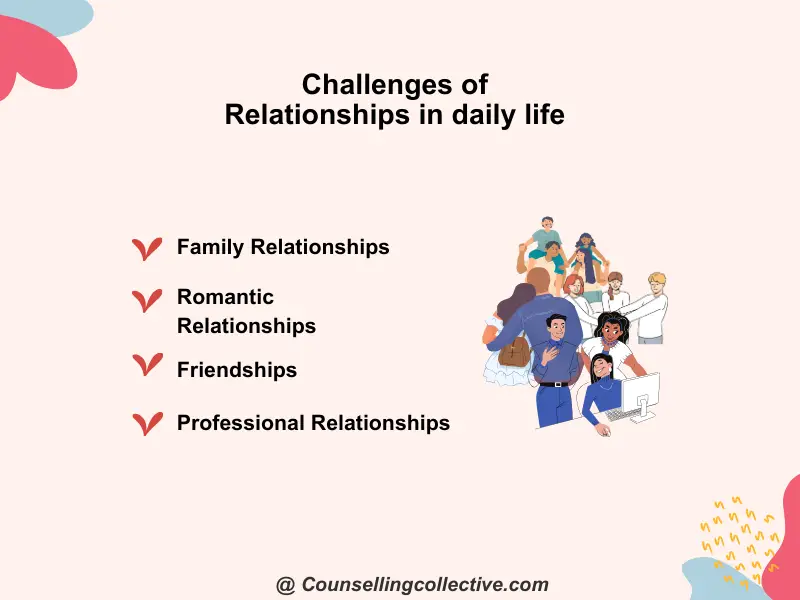
- Romantic Relationships
Romantic relationships involve a deep emotional connection that can be both fulfilling and complex. Challenges such as jealousy, trust issues, and differing life goals can strain the relationship. Effective communication and mutual respect are key to maintaining a healthy romantic relationship. For example, Trust issues arise when one partner spends significant time with a close friend of the opposite sex without transparent communication.
- Friendships
Friendships play a vital role in our social lives, providing companionship and support. However, friendships can face challenges like misunderstandings, changing life circumstances, and conflicts. Nurturing and maintaining friendships require effort and understanding. For example, Misunderstandings occur when one friend feels neglected after the other constantly cancels plans due to work commitments.
- Professional Relationships
Professional relationships, including those with colleagues, supervisors, and clients, are crucial for career success. Challenges in the workplace, such as competition, differing work styles, and communication barriers, require effective relationship management to ensure a positive work environment. For example, Tension arises in a team when conflicting work styles hinder collaboration and decision-making on a critical project.
5 Common Challenges in Relationship Management
- Communication Issues: Poor communication or misunderstandings can lead to conflicts and misunderstandings. Differences in communication styles, lack of clarity, or ineffective listening can strain relationships.
- Trust and Transparency: Building and maintaining trust is crucial. Issues such as dishonesty, secrecy, or breaches of trust can damage relationships severely.
- Conflict Resolution: Managing disagreements and conflicts constructively is essential. Differences in opinions, values, or goals can lead to friction if not handled effectively.
- Balancing Independence and Togetherness: Finding the right balance between individual needs and the needs of the relationship can be challenging. Issues may arise if one partner feels suffocated or neglected.
- External Stressors: External pressures, such as work stress, financial issues, or family dynamics, can impact relationship dynamics. Managing these stressors together can be challenging but is crucial for relationship health.
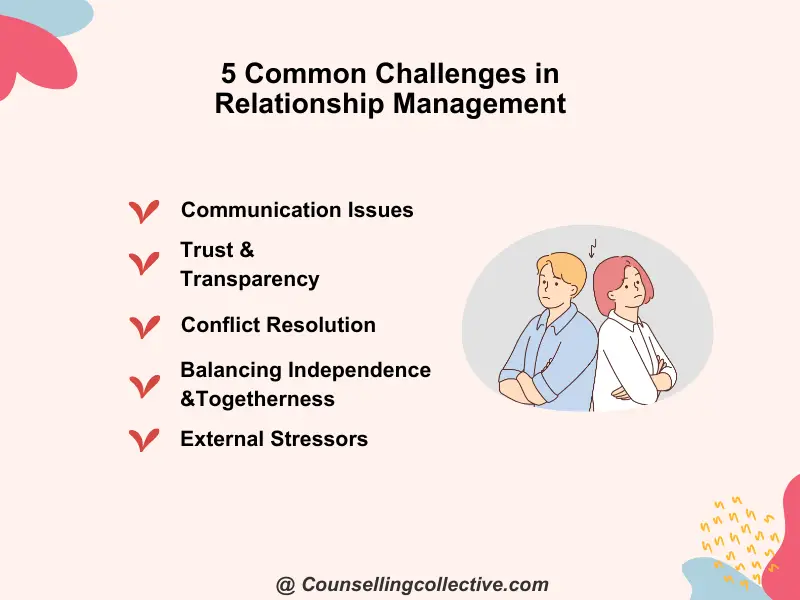
6 Most Important Challenges In Long Distance Relationships
Long-distance relationships can be both rewarding and challenging, offering unique dynamics that differ significantly from traditional close-proximity relationships. While modern technology has made it easier to stay connected, physical distance can still present substantial hurdles for couples. Here are some of the most prevalent challenges faced by individuals in long-distance relationships:
- Communication Struggles: Long-distance relationships often face challenges in maintaining consistent and meaningful communication. Differences in time zones can make scheduling calls or video chats difficult. Misunderstandings can arise from the lack of non-verbal cues, leading to feelings of frustration or disconnect.
- Emotional Disconnect: Physical separation can lead to emotional challenges. Partners may feel lonely or isolated, longing for physical closeness and intimacy. The absence of shared daily experiences can also create a sense of disconnect in understanding each other’s lives fully.
- Trust Issues: Distance can amplify insecurities and doubts about fidelity or commitment. Partners may struggle with trusting each other’s activities and interactions with others due to the lack of direct observation or presence.
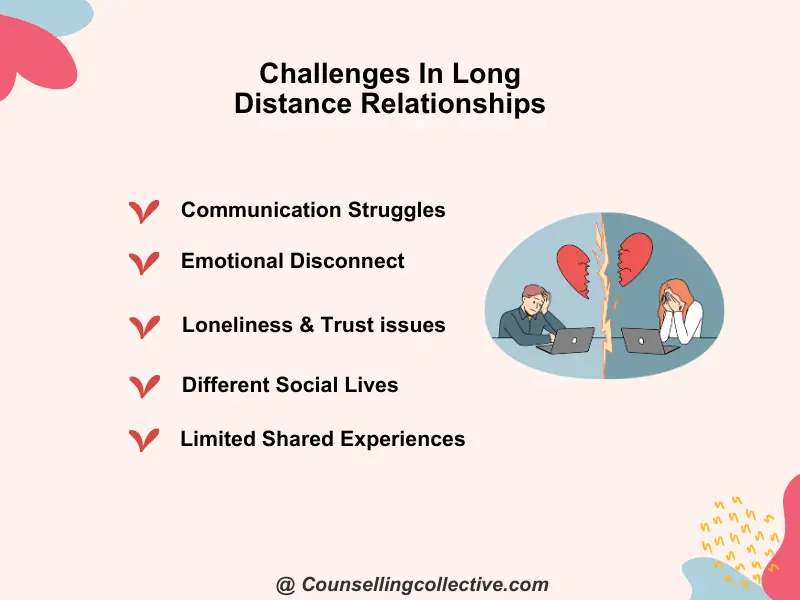
4. Loneliness: Long-distance relationships often involve periods of loneliness. The inability to physically be with one another during important moments or to provide comfort during difficult times can intensify feelings of isolation and sadness.
5. Limited Shared Experiences: Being apart means missing out on sharing everyday activities, outings, and milestones. This can create a sense of longing for normalcy and a shared sense of routine and adventure.
6. Different Social Lives: Geographical distance can lead partners to develop separate social circles and lifestyles. Variations in time zones and availability for communication can further accentuate this separation.
Despite these challenges, many couples in long-distance relationships find ways to overcome them and build strong, lasting connections. Strategies such as regular communication, setting clear expectations, planning visits, and maintaining individual interests can help mitigate some of these obstacles.
Ultimately, successful long-distance relationships require dedication, trust, and a shared commitment to navigating the challenges together.
Improving Communication in Relationships
Communication is vital for building and maintaining healthy relationships. It enables individuals to express their needs, resolve conflicts, and build trust.
Effective communication involves active listening, clear expression, and understanding non-verbal cues. These are seven effective strategies to enhance communication:
- Active Listening: Pay full attention when your partner is speaking. Show that you are listening by nodding, making eye contact, and providing feedback. Avoid interrupting and give them time to express themselves.
- Be Clear and Concise: Express your thoughts and feelings clearly and directly. Avoid ambiguous statements and ensure that your message is easy to understand.
- Use “I” Statements: When discussing feelings or issues, use “I” statements instead of “you” statements. For example, say “I feel hurt when…” instead of “You always…”. This helps to express your feelings without blaming or accusing.
- Empathy: Try to understand your partner’s perspective and feelings. Show empathy by acknowledging their emotions and validating their experiences.
- Nonverbal Communication: Pay attention to nonverbal cues such as body language, facial expressions, and tone of voice. These can convey much more than words and can help you understand your partner better.
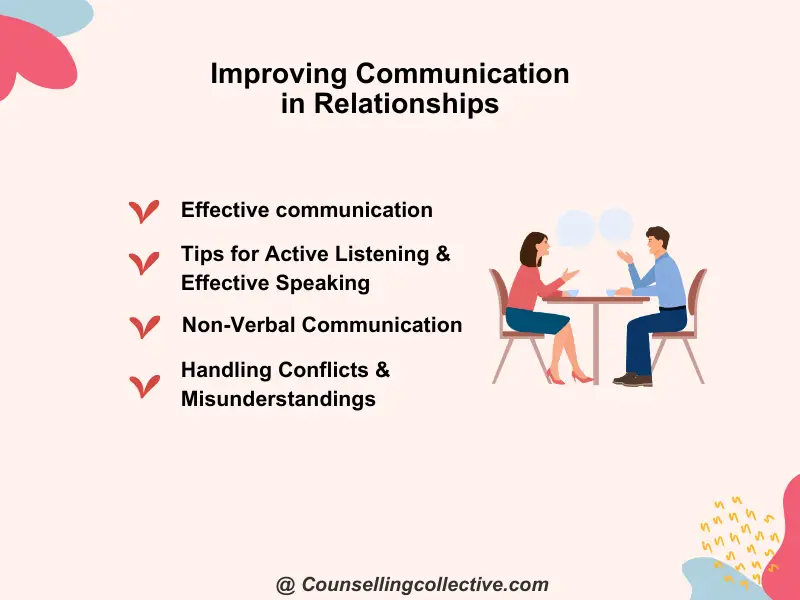
Tips for Active Listening and Effective Speaking
- Active Listening: Focus on the speaker, avoid interrupting, and show empathy. Reflect back what you hear to ensure understanding.
- Effective Speaking: Be clear and concise, avoid accusatory language, and express your feelings and needs honestly. Use “I” statements to take responsibility for your emotions.
Non-Verbal Communication and Its Impact
Non-verbal communication, such as body language, facial expressions, and tone of voice, plays a significant role in conveying messages. Being aware of and effectively using non-verbal cues can enhance communication and prevent misunderstandings.
Handling Conflicts and Misunderstandings
Conflicts are inevitable in any relationship. Handling conflicts constructively involves staying calm, focusing on the issue, and finding mutually acceptable solutions. Avoiding blame and being open to compromise can help resolve misunderstandings.
The upcoming section of the article will cover effective relationship management approaches and techniques. It will explore the role of emotional intelligence in fostering positive relationships, strategies for conflict resolution to maintain harmony, and insights into long-term relationship management for sustained success. These aspects are crucial for cultivating strong and mutually beneficial connections in various contexts, from personal interactions to professional collaborations.
Emotional Intelligence’s Role in Relationship Management
Emotional intelligence (EI) is the ability to recognize, understand, and manage our own emotions, as well as the emotions of others. EI involves self-awareness, self-regulation, empathy, social skills, and motivation.
High emotional intelligence enhances relationship management by:
- Improving Communication: Emotionally intelligent individuals communicate more effectively and understand others’ perspectives.
- Building Empathy: Empathy helps individuals connect with and support each other. EI enables individuals to manage their emotions and approach conflicts constructively.
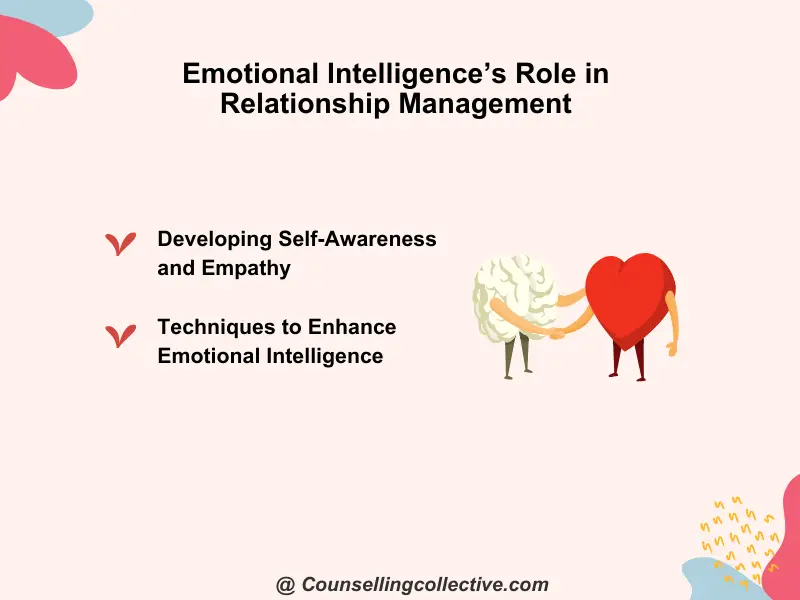
Developing Self-Awareness and Empathy
Self-awareness involves recognizing your emotions, thoughts, and behaviors. Empathy means understanding and sharing others’ feelings. Developing these skills requires regular self-reflection and active listening. Practice mindfulness to stay present and open. This enhances personal growth and fosters stronger, more compassionate relationships.
Techniques to Enhance Emotional Intelligence
Enhance emotional intelligence through self-reflection and mindfulness. Regularly review your emotions and responses to understand triggers and patterns. Practice mindfulness meditation to stay present, manage stress, and develop greater emotional awareness.
Develop active listening and empathy. Focus fully on the speaker, validate their feelings, and seek to understand their perspective. This improves communication and strengthens relationships.
Navigating challenges and conflicts in relationships involves open communication and active listening. Clearly express your feelings and concerns without blaming or criticizing. Listen to your partner’s perspective with empathy and patience, ensuring they feel heard and understood.
Practice compromise and find common ground. Focus on solutions rather than problems, and be willing to make concessions. Maintain respect and avoid letting emotions escalate, fostering a collaborative environment for resolving conflicts.
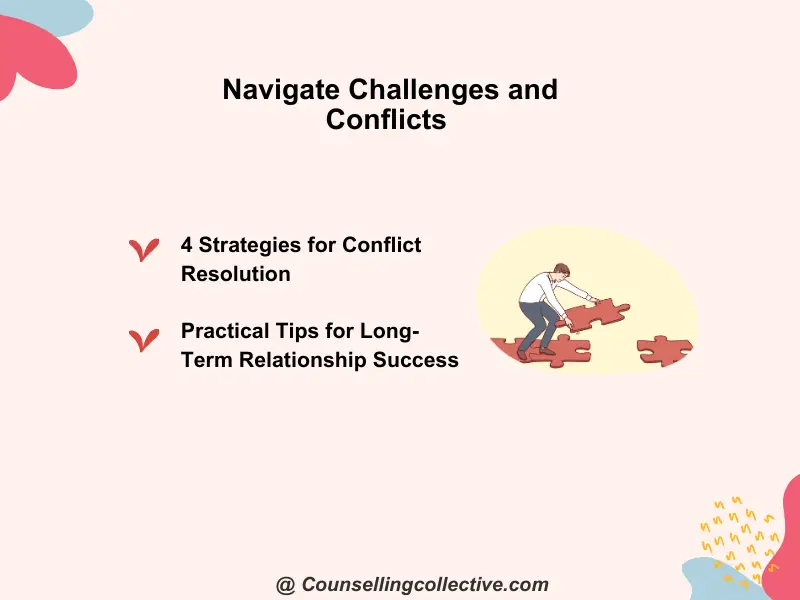
4 Strategies for Conflict Resolution
- Stay Calm: Approach conflicts with a calm and composed mindset.
- Focus on the Issue: Address the specific problem without bringing up unrelated issues.
- Listen Actively: Show empathy and understand the other person’s perspective.
- Find Common Ground: Identify shared goals and work towards a mutually acceptable solution.
Compromise and negotiation are essential in maintaining healthy relationships. They ensure that both parties’ needs and interests are considered, fostering mutual respect and understanding. By finding a middle ground, conflicts are resolved more amicably, reducing resentment and promoting harmony.
Effective negotiation skills help in reaching agreements that satisfy all involved. It involves clear communication, empathy, and flexibility, allowing for creative solutions. This strengthens trust and cooperation, leading to more resilient and fulfilling relationships.
Practical Tips for Long-Term Relationship Success
| Tips | Description |
| 1. Communication | Maintain open, honest, and respectful communication. Discuss feelings, concerns, and goals regularly. |
| 2. Quality Time | Spend quality time together to strengthen your bond. Engage in shared activities and create new experiences. |
| 3. Appreciation | Show appreciation and gratitude for your partner. Small gestures of kindness can go a long way. |
| 4. Support | Offer emotional support and be there for each other during difficult times. |
| 5. Intimacy | Prioritise physical and emotional intimacy to keep the connection strong. |
Connecting You with Mental Health Professionals Therapist
Your go-to resource for discovering local therapists and learning about mental health services. We bridge the gap between therapists and the community by introducing professionals dedicated to your well-being.
Our mission is to demystify finding a therapist through informative articles and profiles, empowering informed decisions. Explore therapy modalities, mental health conditions, and self-care strategies. Connect with therapists committed to helping you live a happier, healthier life.
FAQs On Relationship Management
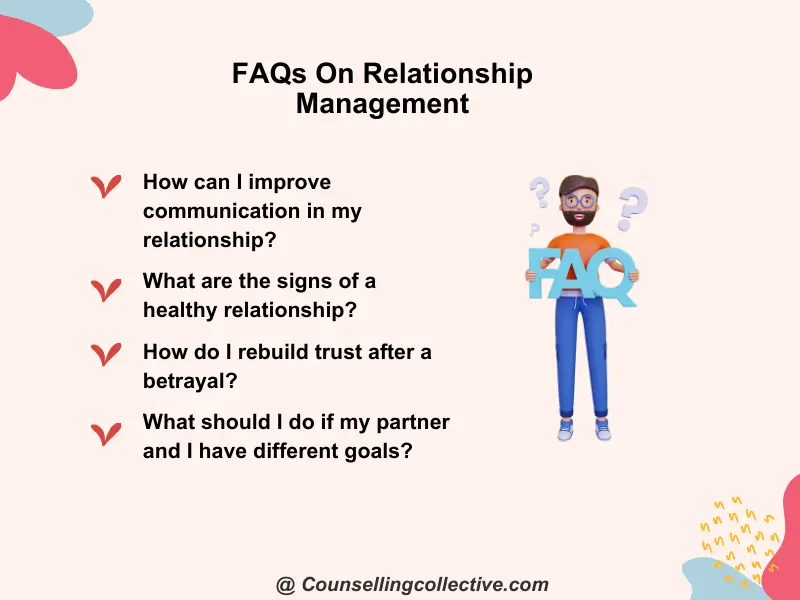
- How can I improve communication in my relationship?
Improving communication in a relationship involves active listening, expressing thoughts clearly, and understanding non-verbal cues. Practise active listening by focusing fully on your partner, avoiding interruptions, and reflecting back what you hear. Clearly express your needs and feelings using “I” statements to take responsibility for your emotions.
- What are the signs of a healthy relationship?
Signs of a healthy relationship include mutual respect, where both partners value and appreciate each other; trust, which involves honesty and reliability; and effective communication, where open and honest dialogue is maintained.
- How do I rebuild trust after a betrayal?
Rebuilding trust after a betrayal involves open communication, consistent actions, and transparency. Start by having honest conversations about the betrayal, addressing feelings and concerns directly.
- What should I do if my partner and I have different goals?
When you and your partner have different goals, it’s essential to communicate openly and understand each other’s aspirations. Begin by discussing your goals honestly and listening to each other’s perspectives without judgment.
Conclusion
Effective relationship management is crucial for maintaining harmony and achieving fulfillment in both personal and professional settings. By fostering open communication, building trust, and resolving conflicts, individuals can create and sustain positive connections that enhance their well-being and success. Emotional intelligence, active listening, and empathy are key components in understanding and responding to the needs of others, ultimately leading to stronger, more supportive relationships.
The ability to manage relationships effectively provides numerous benefits, including improved communication, increased trust, better conflict resolution, and greater personal and professional success. By prioritizing these skills and approaches, individuals can navigate the complexities of relationships with greater ease, ensuring a more harmonious and fulfilling life.
References
[1] Chapman, G. (2015). The 5 love languages: The secret to love that lasts. Northfield Publishing. Amazon
[2] Goleman, D. (2006). Emotional intelligence: Why it can matter more than IQ. Bantam Books. Amazon
[3] Gottman, J., & Silver, N. (2015). The seven principles for making marriage work: A practical guide from the country’s foremost relationship expert. Harmony Books. Amazon
[4] Covey, S. R. (1989). The 7 habits of highly effective people: Powerful lessons in personal change. Free Press. Amazon
[5] Tannen, D. (2001). You just don’t understand: Women and men in conversation. William Morrow.
[6] Brown, B. (2012). Daring greatly: How the courage to be vulnerable transforms the way we live, love, parent, and lead. Gotham Books. Amazon
[7] Perel, E. (2017). The state of affairs: Rethinking infidelity. Harper. Amazon
[8] Rosenberg, M. B. (2015). Nonviolent communication: A language of life. Puddledancer Press. Amazon
[9] Cloud, H., & Townsend, J. (2001). Boundaries: When to say yes, how to say no to take control of your life. Zondervan. Amazon
[10] Fisher, R., Ury, W., & Patton, B. (2011). Getting to yes: Negotiating agreement without giving in. Penguin Books. Amazon
